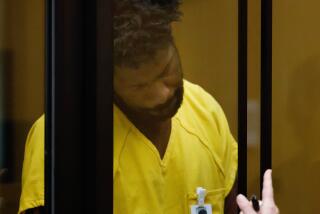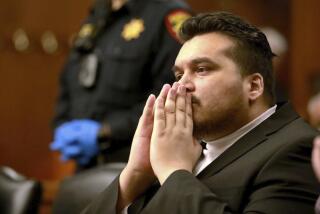Man Convicted in Body Dumping : Justice: Jury finds Soriano guilty of second-degree murder, reject his claim another man stabbed the victim.
- Share via
SANTA ANA — A Stanton man was convicted Monday of second-degree murder in the stabbing of a 20-year-old woman whose nude body was found dumped along a deserted stretch of Ortega Highway earlier this year.
Francisco Martinez Soriano, 29, also was convicted of use of deadly weapons--a knife and a tire iron--in the death of Teresa Cacho of Riverside County.
For the record:
12:00 a.m. Nov. 21, 1991 For the Record
Los Angeles Times Thursday November 21, 1991 Orange County Edition Metro Part B Page 3 Column 5 Metro Desk 3 inches; 84 words Type of Material: Correction
Soriano verdict--A story Tuesday misidentified the victim in the trial of Francisco Martinez Soriano, who was convicted Monday of the stabbing death of a young woman whose body was found along Ortega Highway near San Juan Capistrano in late January, 1991. Soriano’s victim has never been positively identified. The story incorrectly reported that he was convicted in the death of Teresa Cacho, who was suffocated and whose body was found wrapped in a blanket on Ortega Highway, 5 miles farther east, on Feb. 3. Two other suspects are in custody and awaiting trial in connection with the death of Cacho.
Soriano faces 16 years to life in prison for the murder conviction, according to Deputy Dist. Atty. Ronald Cafferty, who prosecuted the case. His sentence could be extended to 21 years to life if the remaining portion of a prior conviction for assault with a firearm is added, as required by law, Cafferty said.
Cacho was last seen alive leaving an Anaheim bar on Jan. 27. Her body, with stab wounds to the chest and throat, was discovered wrapped in a blanket on Feb. 3 at the bottom of a dirt embankment, near a grove of trees off the Ortega Highway near the Orange-Riverside county line.
Soriano, who was seen at the bar with Cacho, was arrested in early April in Phoenix by police who were working on a tip from Orange County sheriff’s deputies.
During the trial, the prosecution contended that the killing may have grown out of Cacho’s revulsion with Soriano’s right hand, which is missing three fingers.
“He wouldn’t accept that,” Cafferty said. “He wanted her sexually, that’s obvious. . . . He couldn’t handle the hand, and for that she had to die.”
Cafferty also charged that after stabbing Cacho, Soriano “carved his initials (on her chest), claiming her.”
Cafferty called Soriano “obsessed” and characterized his actions as “deliberate, premeditated acts.”
The prosecution introduced forensic evidence that included Cacho’s bloodstains in Soriano’s car and tire tracks from his vehicle near the grove where the body was found.
Soriano’s attorney, Deputy Public Defender Anthony Charles Kies, asked the jury during his closing argument to acknowledge Soriano’s “total and undeniable innocence” of the killing.
According to Kies, Soriano testified that “there was another man involved and that (Soriano) was actually the object of a robbery attempt by the other man, that (Cacho) apparently was an accomplice of the other man. . . .
“Mr. Soriano had a fight with the other man, and Mr. Soriano--after beating up the other man, and striking the woman, and leaving her stunned . . . left the area. So, Mr. Soriano said he had nothing to do with the (killing). . . . Regrettably, the jury didn’t believe him.”
After the verdict was announced, jurors said they were initially split 10 to 2 in favor of first-degree murder, which carries a 25-years-to-life sentence. However, the two holdout jurors would not yield. After deliberating more than two days, the jury decided on second-degree murder.
Donald L. Wagoner, of Huntington Beach, the jury foreman said most of the jurors did not find Soriano’s account of what happened convincing.
“Many (jurors) thought that what he had said was a lie,” Wagoner said.
Soriano pleaded guilty to two counts of assault with deadly weapon in 1988 for firing shots at two Stanton teen-agers. He faced up to nine years in prison, but was sentenced to one year in County Jail and three years’ probation under a plea-bargain arrangement. The difference between the maximum sentence and what he served--five years--could be added to the sentence for Monday’s conviction, Cafferty said.
More to Read
Sign up for Essential California
The most important California stories and recommendations in your inbox every morning.
You may occasionally receive promotional content from the Los Angeles Times.










